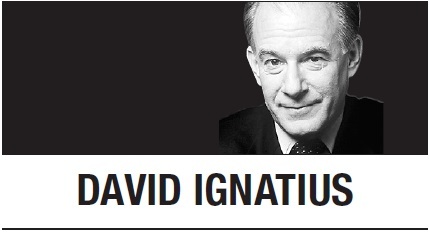[David Ignatius] Trump disdains postwar architecture
By David IgnatiusPublished : June 9, 2019 - 17:14
 President Trump spoke the right words in commemorating the 75th anniversary of D-Day, but did he mean them? So far, his presidency has been about defying the postwar order that was based on shared values and global partnership, rather than cementing its legacy.
President Trump spoke the right words in commemorating the 75th anniversary of D-Day, but did he mean them? So far, his presidency has been about defying the postwar order that was based on shared values and global partnership, rather than cementing its legacy. Trump spoke here Thursday at what he rightly described as “freedom’s altar,” the burial site for nearly 10,000 Americans who died in the 1944 invasion of Normandy and in subsequent battles that ultimately led to Nazi Germany’s destruction. His speech rang the traditional chimes of D-Day remembrance of heroism, shared sacrifice and Allied victory.
Listening to Trump’s well-written and emotionally resonant speech, this listener applauded the sentiments but couldn’t help wondering: Does Trump fully embrace this message, and the trans-Atlantic alliance that made victory against Germany possible? His actions (and usual rhetoric) have instead embodied an “America First” agenda that disdains much of the postwar architecture.
“To all of our friends and partners: Our cherished alliance was forged in the heat of battle, tested in the trials of war, and proven in the blessings of peace,” Trump proclaimed. “Our bond is unbreakable.” Was that reassuring to European allies who have been rattled so often by Trump’s disruptive statements? I doubt it.
Trump’s endorsement of trans-Atlantic cooperation came after a week in which he attacked the mayor of London as a “stone cold loser,” called for a no-deal Brexit that could weaken both Britain and the European Union, and said he favors a wall, or at least a hard border, between the Irish Republic and Northern Ireland, which could undermine peace there.
The strength of Trump’s speech here was that, in the style of Ronald Reagan, he evoked the personal lives of the D-Day veterans assembled behind him on the podium. For once, he wasn’t telling his own story, but that of America and its allies. “More powerful than the strength of American arms was the strength of American hearts,” he said. It was a great line, but one that many would find dissonant with Trump’s saber-rattling nationalism.
Trump seemed to understand that this site, with its forest of white crosses, assembled like a silent army at perpetual rest, may be the most important stage on which an American president can play. Arrayed atop the escarpment above Omaha Beach, the cemetery makes viscerally real the hellfire through which American soldiers had to pass to win the day of battle. The first waves of soldiers moved forward because they had no other choice: They went up the hill or they died.
This D-Day anniversary was especially poignant because the surviving veterans are now all in their 90s or older, and few are likely to be alive for an 80th-anniversary celebration. That made their presence here an emotional touchstone for Trump and his host, French President Emmanuel Macron, who delivered a superb speech on the theme: “France has not forgotten.”
The convocation above Omaha Beach also allowed reflection on the qualities of leadership that made possible D-Day and the eventual triumph over Nazi Germany. These traits have been best captured by historian Rick Atkinson in his trilogy about World War II in Europe, culminating in the D-Day narrative that opens the last volume, “The Guns at Last Light.”
What defines these heroic leaders is their fortitude under stress, but also their recognition of the ambiguity and chaos of war. British Prime Minister Winston Churchill, drinking heavily as usual, told his colleagues on the eve of the invasion: “Let us not expect all to go according to plan. Flexibility of mind will be one of the decisive factors. Risks must be taken.”
Gen. Dwight Eisenhower, the seemingly calm architect of victory, was so frazzled in the days before D-Day that he was smoking 80 cigarettes a day, Atkinson writes. Ike liked to quote Napoleon’s description of a brilliant general as “the man who can do the average thing when all those around him are going crazy.”
The supreme commander of the global war machine was President Franklin D. Roosevelt. He let his generals and admirals direct the combat operations, but he set the fundamental strategy that was decisive. Perhaps most important, FDR insisted on the goal of “unconditional surrender” at the Casablanca Conference with Churchill in January 1943, which mandated the destruction of German and Japanese militarism and opened the way for a new world order.
President Trump stood in the shadow of these leaders, voicing the convictions that helped them gain final victory. Rarely did a speech and the speaker seem so much in conflict.
David Ignatius
Follow David Ignatius on Twitter: @IgnatiusPost -- Ed.
(Washington Post Writers Group)



![[AtoZ into Korean mind] Humor in Korea: Navigating the line between what's funny and not](http://res.heraldm.com/phpwas/restmb_idxmake.php?idx=644&simg=/content/image/2024/04/22/20240422050642_0.jpg&u=)

![[Exclusive] Korean military set to ban iPhones over 'security' concerns](http://res.heraldm.com/phpwas/restmb_idxmake.php?idx=644&simg=/content/image/2024/04/23/20240423050599_0.jpg&u=20240423183955)

![[Herald Interview] Why Toss invited hackers to penetrate its system](http://res.heraldm.com/phpwas/restmb_idxmake.php?idx=644&simg=/content/image/2024/04/22/20240422050569_0.jpg&u=20240422150649)
![[Graphic News] 77% of young Koreans still financially dependent](http://res.heraldm.com/phpwas/restmb_idxmake.php?idx=644&simg=/content/image/2024/04/22/20240422050762_0.gif&u=)






![[Exclusive] Korean military to ban iPhones over security issues](http://res.heraldm.com/phpwas/restmb_idxmake.php?idx=652&simg=/content/image/2024/04/23/20240423050599_0.jpg&u=20240423183955)



![[Today’s K-pop] Ateez confirms US tour details](http://res.heraldm.com/phpwas/restmb_idxmake.php?idx=642&simg=/content/image/2024/04/23/20240423050700_0.jpg&u=)